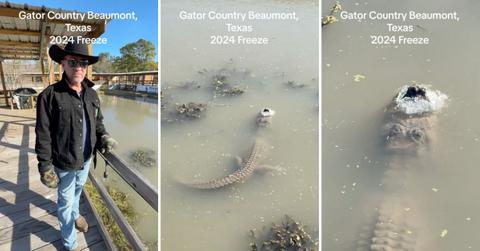Miraculous Survival: Alligator Found Alive and Frozen in Texas Pond Amid Winter Chill
Published Jan. 22 2024, 12:25 p.m. ET
Alligators aren’t typically found living in northern states, where the winters can get pretty cold. But what happens when the temperatures dip below freezing in the warm weather states they inhabit?
A viral TikTok video posted by the Gator Country reptile rescue in Beaumont, Texas, shows an alligator literally frozen in a pond — and miraculously, the animal was still alive. Here are the details about the frozen alligator and how he was able to survive this freezing.

An alligator was found alive, but frozen in a pond, in the Texas winter.
The TikTok video of the frozen alligator was taken on Jan. 16, 2024, when the low temps in Beaumont, Texas dropped to as low as 20 degrees Fahrenheit, according to CBS News. It was taken at the Gator Country Adventure Park, which touts itself as the biggest alligator sanctuary in Southeast Texas.
All of the sanctuary's 450-plus animals come from rescues, donations, and cases of abandonment.
Park owner Gary Saurage used the video as a sort of teaching moment about how alligators survive in cold winter conditions. He points out the alligator who is almost completely submerged in frozen water. Only the alligator’s snout is visible above the ice.
“Look right down here. You can see the entire body of the alligator. But most importantly, look at his snout. He has pushed its snout up through toward the oxygen to breathe,” Saurage said in the video. “That animal is in full hibernation right there. His heart's beating three beats per minute. Folks, that's amazing.”
The frozen alligator was not in any harm; he was just in brumation, a state similar to hibernation.
The alligator isn’t exactly hibernating, he's brumating, according to the South Carolina Aquarium. Although brumation is similar to hibernation in that they are both periods when animals go dormant for the winter, hibernation is for warm-blooded animals, while brumation is for cold-blooded animals.
When warm-blooded animals hibernate, they enter a deep sleep where their metabolic rate, heart rate, and body temperature lower, and they don’t wake up to eat or drink for several months, per World Animal Protection.
Cold-blooded animals and reptiles, such as alligators, may brumate during cold weather instead. While they may still move around a bit and drink water to stay hydrated, their metabolic rate slows considerably, and they don’t eat during this time, per the South Carolina Aquarium.
The act of sticking their noses out of frozen water to breathe is called “snorkeling,” per the Cajun Encounters Tour Co.
“As long as they can keep their nostrils above the water level, they should survive,” according to the U.S. Forest Service - Ouachita National Forest.
So if you happen upon a frozen pond this winter, don't get worried if you see a frozen alligator whose snout is sticking out above the water line. They're just brumating!
